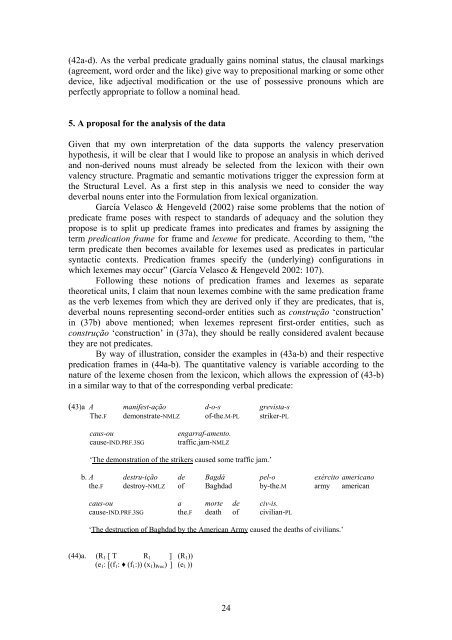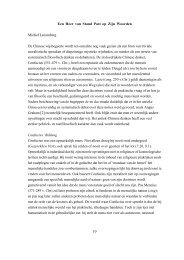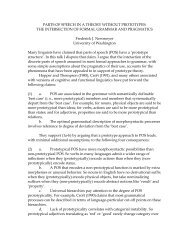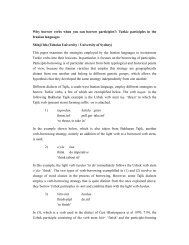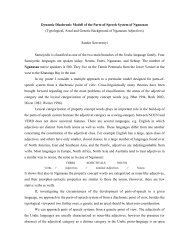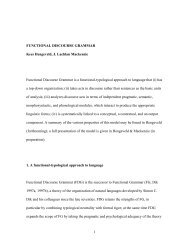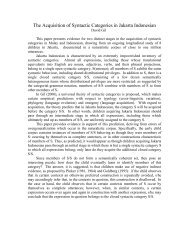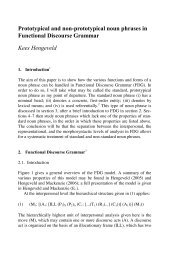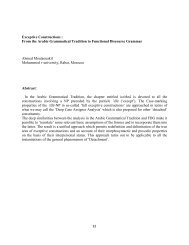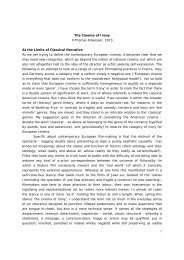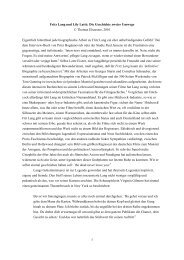The argument structure of deverbal nouns in Brazilian Portuguese
The argument structure of deverbal nouns in Brazilian Portuguese
The argument structure of deverbal nouns in Brazilian Portuguese
Create successful ePaper yourself
Turn your PDF publications into a flip-book with our unique Google optimized e-Paper software.
(42a-d). As the verbal predicate gradually ga<strong>in</strong>s nom<strong>in</strong>al status, the clausal mark<strong>in</strong>gs<br />
(agreement, word order and the like) give way to prepositional mark<strong>in</strong>g or some other<br />
device, like adjectival modification or the use <strong>of</strong> possessive pro<strong>nouns</strong> which are<br />
perfectly appropriate to follow a nom<strong>in</strong>al head.<br />
5. A proposal for the analysis <strong>of</strong> the data<br />
Given that my own <strong>in</strong>terpretation <strong>of</strong> the data supports the valency preservation<br />
hypothesis, it will be clear that I would like to propose an analysis <strong>in</strong> which derived<br />
and non-derived <strong>nouns</strong> must already be selected from the lexicon with their own<br />
valency <strong>structure</strong>. Pragmatic and semantic motivations trigger the expression form at<br />
the Structural Level. As a first step <strong>in</strong> this analysis we need to consider the way<br />
<strong>deverbal</strong> <strong>nouns</strong> enter <strong>in</strong>to the Formulation from lexical organization.<br />
García Velasco & Hengeveld (2002) raise some problems that the notion <strong>of</strong><br />
predicate frame poses with respect to standards <strong>of</strong> adequacy and the solution they<br />
propose is to split up predicate frames <strong>in</strong>to predicates and frames by assign<strong>in</strong>g the<br />
term predication frame for frame and lexeme for predicate. Accord<strong>in</strong>g to them, “the<br />
term predicate then becomes available for lexemes used as predicates <strong>in</strong> particular<br />
syntactic contexts. Predication frames specify the (underly<strong>in</strong>g) configurations <strong>in</strong><br />
which lexemes may occur” (García Velasco & Hengeveld 2002: 107).<br />
Follow<strong>in</strong>g these notions <strong>of</strong> predication frames and lexemes as separate<br />
theoretical units, I claim that noun lexemes comb<strong>in</strong>e with the same predication frame<br />
as the verb lexemes from which they are derived only if they are predicates, that is,<br />
<strong>deverbal</strong> <strong>nouns</strong> represent<strong>in</strong>g second-order entities such as construção ‘construction’<br />
<strong>in</strong> (37b) above mentioned; when lexemes represent first-order entities, such as<br />
construção ‘construction’ <strong>in</strong> (37a), they should be really considered avalent because<br />
they are not predicates.<br />
By way <strong>of</strong> illustration, consider the examples <strong>in</strong> (43a-b) and their respective<br />
predication frames <strong>in</strong> (44a-b). <strong>The</strong> quantitative valency is variable accord<strong>in</strong>g to the<br />
nature <strong>of</strong> the lexeme chosen from the lexicon, which allows the expression <strong>of</strong> (43-b)<br />
<strong>in</strong> a similar way to that <strong>of</strong> the correspond<strong>in</strong>g verbal predicate:<br />
(43)a A manifest-ação d-o-s grevista-s<br />
<strong>The</strong>.F demonstrate-NMLZ <strong>of</strong>-the.M-PL striker-PL<br />
caus-ou engarraf-amento.<br />
cause-IND.PRF.3SG traffic.jam-NMLZ<br />
‘<strong>The</strong> demonstration <strong>of</strong> the strikers caused some traffic jam.’<br />
b. A destru-ição de Bagdá pel-o exército americano<br />
the.F destroy-NMLZ <strong>of</strong> Baghdad by-the.M army american<br />
caus-ou a morte de civ-is.<br />
cause-IND.PRF.3SG the.F death <strong>of</strong> civilian-PL<br />
‘<strong>The</strong> destruction <strong>of</strong> Baghdad by the American Army caused the deaths <strong>of</strong> civilians.’<br />
(44)a. (R1 [ T R1 ] (R1))<br />
(e1: [(f1: ♦ (f1:)) (x1)Proc) ] (e1 ))<br />
24


